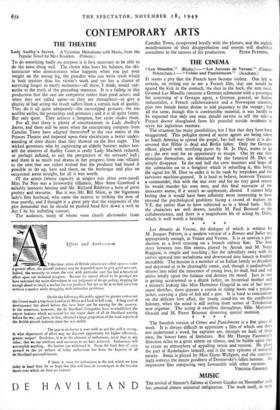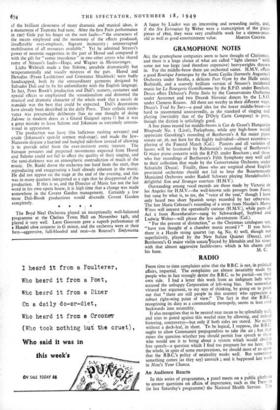MUSIC
THE revival of Strauss's Salome at Covent Garden on November itth has aroused almost universal indignation. The work itself, in spite
of the brilliant cleverness of many dramatic and musical ideas, is a monument of Teutonic bad taste. After the first Paris performance in 1907 Gide put his finger on the root faults—" the coarseness of the means employed and the monotony of the effects produced, insufferable over-emphasis, flagrant insincerity ; uninterrupted mobilisation of all resources available." Yet he admitted Strauss's power of neurotic suggestion in the part of Herod and compared it with the gift for " comic truculence " in two other artists who shared some of Strauss's faults—Hugo, and Wagner in Meistersinger.
Ljuba Wclitsch made a fine Salome, unsubtle dramatically but temperamentally and vocally mistress of the part. Herod and Herodias (Franz Lechlcitner and Constance Shacklock) were badly handicapped, both by the extraordinary garments designed by Salvador Dali and he by his unfamiliarity with the English language. In fact, Peter Brook's production and Dali's scenery, costumes and special effects so emphasised the sensationalism and distorted the musical and dramatic character of the whole work that a succes de scandale was the best that could be expected. Dali's decorations have already been described in the daily Press. Their stylistic irrele- vance was presumably deliberate (has no one thought of doing Salome in modern dress as a Grand Guignol opera ?) but it was II great mistake to leave Salome and Jokanaan so extremely conven- tional in appearance.
The production was fussy (the ludicrous rushing servants) and crude (Jokanaan's spot-lit sermon mid-stage), and made the Jew- Nazarene dispute a hurried and bungled sideshow instead of allowing it to provide relief from the over-insistent erotic interest. The baroque postures and perpetual movements expected from Herod and Salome could not fail to affect the quality of their singing, and the semi-darkness was an atmospheric contradiction of much of the music. Dr. Rankl drove the orchestra too hard from the start, thus reproducing and exaggerating a fault already inherent in the music. He did not appear on the stage at the end of the evening, and this was in many quarters interpreted as a sign that he disapproved of the production. If this is so, and the Director of Music has not the last word in his own opera house, it is high time that a change was made somewhere in the Covent Garden management. Certainly a few more Dali-Brook productions would discredit Covent Garden completely. * * * * The Boyd Ned Orchestra played an exceptionally well-balanced programme at the Chelsea Town Hall on November 14th, and played it very well. Leon Goossens gave a superb performance of a Handel oboe concerto in G minor, and the orchestra were at their best—aggressive, full-blooded and neat—in Roussel's Sinfonietta. A fugue by Liadov was an interesting and rewarding rarity, and, if the Six Ecossaises by Weber were a transcription of the piano pieces of 1802, they were very creditable work for a sixteen-year- old as well as good entertainment value. MARTIN COOPER.















































































 Previous page
Previous page